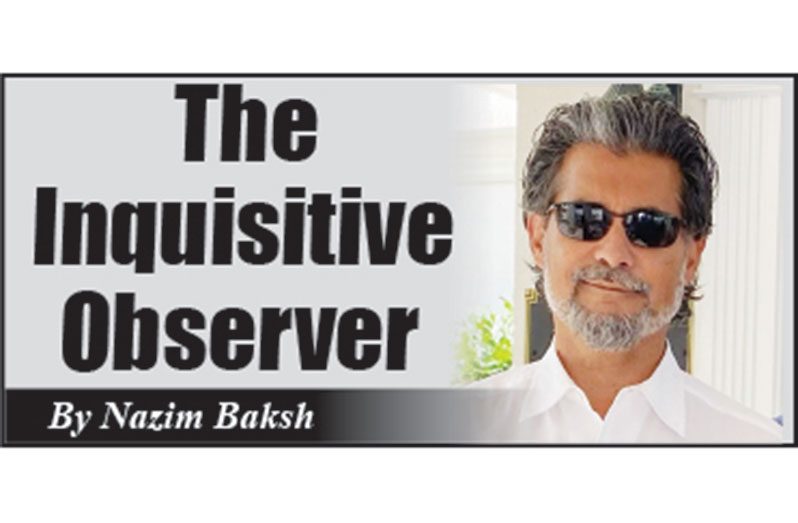BEYOND the spirited exchanges between rival parties, every election is, at its heart, a contest of our competing visions for our future. Most Guyanese dream of a better tomorrow for themselves and their children, a future shaped more by choice and less by chance. This yearning often makes continuity a comforting preference, and yet sometimes, our circumstances demand bold change, not just incremental adjustment.
In our elections, the vote for continuity prevailed; that much is evident, but victory demands reflection. If we truly desire progress, there are things within us and around us that must change. We are duped too easily by the slime of social media trolls rather than by the incredible opportunities Facebook, Instagram and TikTok offer us to learn and improve our understanding of the world.
I can’t count the number of times that someone would ask me whether I heard what “Melly Mel,” Amier Ahmad or “The Critic” had to say about something or the other. On every single occasion that I have allowed myself to indulge, I have never been able to find anything of merit in the so-called “explosive dirt” they claim to dredge up. Nothing I have ever heard passes the litmus test of being credible evidence that can be published in a reputable media outlet. And yet it is trafficked on social media and peddled in society as if it reflects a worthy version of the truth.
We can’t get to the shining ‘city on the hill’ by allowing social media trolls to hang out in our backpacks. It is time to switch them off and begin supporting credible media outlets; thankfully, there are many to choose from in Guyana, regardless of which side of the political aisle you happen to sit. I don’t agree with the editorial position of some newspapers, but I read them nevertheless. I’d be a fool not to do so.
I have a surprising but somewhat predictable confession; I’d prefer to live in a society with competing free media than one in which journalists are killed for doing their job. I shiver at the thought of what it must be like for the families, and for society, of the 25 journalists who were reportedly killed in Yemen by Israeli air strikes two days ago.
Days before our elections, five journalists, including a photographer who worked for Al Jazeera, the news outlet that many Guyanese depend on to report on the genocide taking place in Gaza, were killed when Israel launched an attack on the Nasser Medical Complex. In total, 21 people were killed in what was a “double tap” strike, one missile hitting first, then another moments later as rescue crews arrived.
It wasn’t only the Al Jazeera family that grieved the loss; Reuters, The Independent Arabic, Quds Feed Network, Middle East Eye and The Associated Press news agencies suffered as well. Mohammed Salama, one of the Al Jazeera journalists killed, was planning to get married after a ceasefire. Mariam Abu Daqqa leaves behind a 12-year-old son.
In a separate incident that same day, Hassan Douhan, a journalist and academic who worked as a correspondent for Al-Hayat al-Jadida publication, was killed in Khan Younis. More than 273 journalists, the majority Palestinians, have been killed in Gaza and the Occupied West Bank in less than two years, making Gaza the most dangerous place on earth for journalists.
The intent of the Israeli regime has been obvious all along for anyone paying close attention: bury the truth. We do them a disservice when we choose to feast on gossip and disinformation instead of verifiable information.
I still tear up every time I remember my dear friend and investigative journalist Saleem Shahzad, Pakistan’s Bureau Chief for Asia Times Online. He was murdered in 2011 at the age of 40. I still recall our many phone calls when we were collaborating on stories.
Saleem and I were in Kabul together in January 2008 when the five-star Serena hotel was attacked by terrorists linked to the Haqqani network. In all, six people were killed, including U.S. citizen, Thor David Hesla and Norwegian journalist, Carsten Thomassen. Having breakfast with him that morning, Saleem told me that fear was his bedtime companion. I don’t know what he was working on at the time of his death, but it must have been something that evil people didn’t want the public to know. I am fortunate to be living in a country where press freedom is constitutionally enshrined and robustly defended, a privilege we must never take for granted.
Guyana’s media serves as both a mirror and a conscience for our nation. We have a choice: to seek out truth through reputable sources, to hold fast to the standards of evidence, and to value the many journalists who risk much and endure many pressures in defence of the public’s right to know.
Let us not squander our freedom on the cheap currency of gossip and internet bile. Instead, let’s champion media that pursues accuracy, context, and integrity. When we choose substance over spectacle, inquiry over innuendo, we honour the memory of those who have paid the ultimate price for the truth, and, in doing so, we are investing in a Guyana that our children deserve to inherit.
DISCLAIMER: The views and opinions expressed in this column are solely those of the author and do not necessarily reflect the official policy or position of the Guyana National Newspapers Limited.



.jpg)








